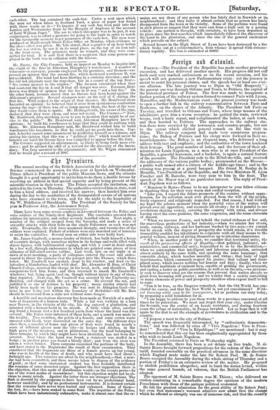b Vrouturro.
The annual meeting of the British Association for the Advancement of Science commenced its session for this year at Ipswich on Wednesday. Prince Albert is President of the public Museum there, and the citizens thought it a good opportunity to invite him to do them a double favour by receiving an address in that special capacity and by being present at the scientific reunion in their town. The Prince accepted the invitation, and arrived in the town on Thursday. The authorities received him in state, read to him a loyal address, and received his answer; then handed him over during the day to the assiduities of the distinguished savans of all nations who have swarmed to the town, and for the night to the hospitality of Sir W. Middleton of Shrublands. The President of the Society for this year is Professor Airy, the Astronomer Royal.
There have been some severe conflicts in Liverpool between the Police and some soldiers of the Ninety-first Regiment. The constables arrested three soldiers for intoxication, and rather severely handled others. Next night, a number of the soldiers escaped from the barracks, and made a series of cowardly attacks with their belts on the single Policemen as each was met with. Eventually, the civil force mustered strongly, and twenty-five of the soldiers were captured. Pickets of soldiers were also marched out of barracks to assist the constables. Several men on either side were badly hurt.
Mr. James Caudwell, a money-lender of Oxford, has built himself a house of eccentric design, with numerous niches in its facings and walls filled with stucco figures, with battlemented copings, and with a court in front armed by a low wall, through embrasures in which are pointed some pieces of iron ordnance of full-sized service calibre. Last week, late on one night or at dawn of next morning, a party of collegians entered the court and endea- voured to throw the cannons over the parapet into the Thames, which flows below. Mr. Caudwell was awaked, crept to his window, and fired on the intruders a blunderbuss loaded with shot. Mr. Alexander H. Ross, of Christ Church College, received the charge in his head, neck, and shoulders. His companions took him home, and then returned to smash Mr. Caudwell's windows; but, being again tred on, though without injury to any of them, they departed. Next day, Mr. Caudwell was arrested by the University au- thorities, and charged with the act as a crime. He avowed the act, and justified it as one of defence to his property; many similar attacks had lately been made on his premises. He was sent to Abingdon Gaol—the i locus in quo being just within the boundary of Berkshire—till Mr. Ross should be recovered from a state not without some danger.
A horrible and mysterious discovery has been made at Norwich of a multi- tude of fragments of a human body. While a lad was walking in a lane near Trowse, in the vicinity of the city, his dog entered a plantation, and returned with a human hand in its mouth. A little while after, another dog found a human foot a few hundred yards from where the hand was dis- covered. The Police were informed of these facts, and a search was made in the locality. Two vertebra;, the pelvis of a female, and some cotton waste smeared with blood, were discovered on the same day. On different days since then, a number of bones and pieces of flesh were found in nearly a score of different places near the city—in hedges and ditches, in the high grass of the meadows, and in plantations: but the head belonging to these remains, by which they might have been identified, has not been dis- covered. Near where the hand was found, a waistcoat was stuffed in a hedge ; in another place was found a bloody shirt ; and from the river was taken a velvet bonnet. Three surgeons examined the portions of the body, and have stated to the Magistrates the result of their examination. They considered that the fragments are those of a female grown up but young, who was in health at the time of death, and who must have died about a fortnight ago. Two surmises are afloat in the neighbourhood,—that a mur- der had been committed, and these means taken to dispose of the evidence of guilt; or that some anatomical student has thus foolishly distributed the remains of some dissected corpse. Against the first supposition there is the objection, that this mode of distribution would—as the events prove—be one of the worst modes of concealment: but this objection might not be ob- vious to many minds. Against the latter there are stronger objections. The flesh is deemed by she surgeons to have been cut by no professional hand, however unskilful • and by no professional instruments. It is deemed certain that the remains Lye never been buried and exhumed. Some of them— the foot, &c.—have been soaked in some fluid. The inquiries of the Police, which have been industriously exhaustive, make it almost sure that the re- mains are not those of any person who has lately died in Norwich or its neighbourhood ; and they make it almost certain that no person has lately disappeared from the town or its vicinity. Some of the portions were found in such places as suggest that they were cast from a high seat in a passing vehicle: one portion is thought, with certainty, to have been deposited in its place since the first searches which immediately followed the discovery of the hand in the plantation, and since the rise of the general excitement which prevails on the subject.
Several houses in the High Street of Lynn have been destroyed by a fire which broke out at a cabinetmaker's, from whence it spread with extraor- dinary rapidity. The loss is estimated at 80001.


























 Previous page
Previous page